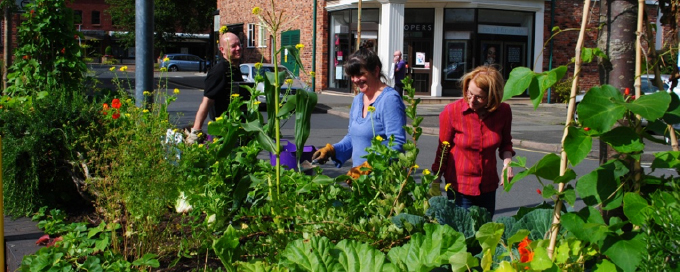Incredible Edible
6th September, 2013
Contributor: Brussels (Strategic Design Scenarios)
Going forward to provide access to local food for all through working together, learning and supporting local business
Motivations
The network is called “Incredible Edible” and is the over-all sign of the movement. Groups, Individuals or even a business is able to get a member. At first there is the big idea of sharing responsibility for the future wellbeing of our planet and ourselfes. The network wants to trackle that challenge by the aim to provide food access to local food for all. That is happen first through working together in a community. Second by education by that people create understanding for the production and the fabrication of food.
Results
On the one hand there are volunteer citizens found and engage in community groups for producing their own food in a sustainable way. So in a local environment they plant and grow vegetables, fruits and herbs, build up beds, ochards, keep bees and chickens. That is practiced either in private gardens or in pubic bodies. So either engaged people open their garden for them neighbourhood and give therefore a common place for gardening; Or people build up beds within the public space. Sometimes the group plant unused area. Also businesses can engage by giving space for planting to the employees. Canteens and schools deliver food from local places, which they get access to through the network community. Experts give courses about production of food. The network itself links each individual engagement to another so knowledge and experiences can get shared.
Benefits
It is easier and more efficient that people share the process of the production by parting the whole production in several areas of responsibility. So they get an access to local food in urban areas. Because the gardening areas are public these places are open for everybody. So even people that are not participating at the production of the food can have access to that gardens. That increase trust of people in a community or district and bring people together that haven’t known each other before.
Through the educational courses the people get help and knowledge to improve their own food production on the one hand. Also they create an idea of the whole circle around production, delivery and healthy cooking. On the other hand the valuable heritage of knowledge can get shared and disseminated.
The focus on local food delivery by canteens etc. gives a positive impact to the sustainable and green economy around the city.
Finally the network acts as a connection between the different actors, as a help forum and a common basis.
Pro and Contra
The idea of creating new green space through vegetables which are produced by the customers themselves is really forward-looking and provide an answer to the need of a special group of urban citizens.
On the other hand the already existing ecological farmers lose one group of customers. The network is more addressed to people with a sustainable sense and a sense for gardening. The second target group are people that are interested in a sustainable life but don’t have the time resources or the gardening hobby. For them there is no special role or something hey could contribute to the shared gardens.
What are the lessons learn to be used/transferred/implemented in the other partner cities?
Question to the network
- How the city might support a developing initiative by providing proper gardening areas and how they might be connected?
- How the unused areas in cities might be developed into green gardening areas?
